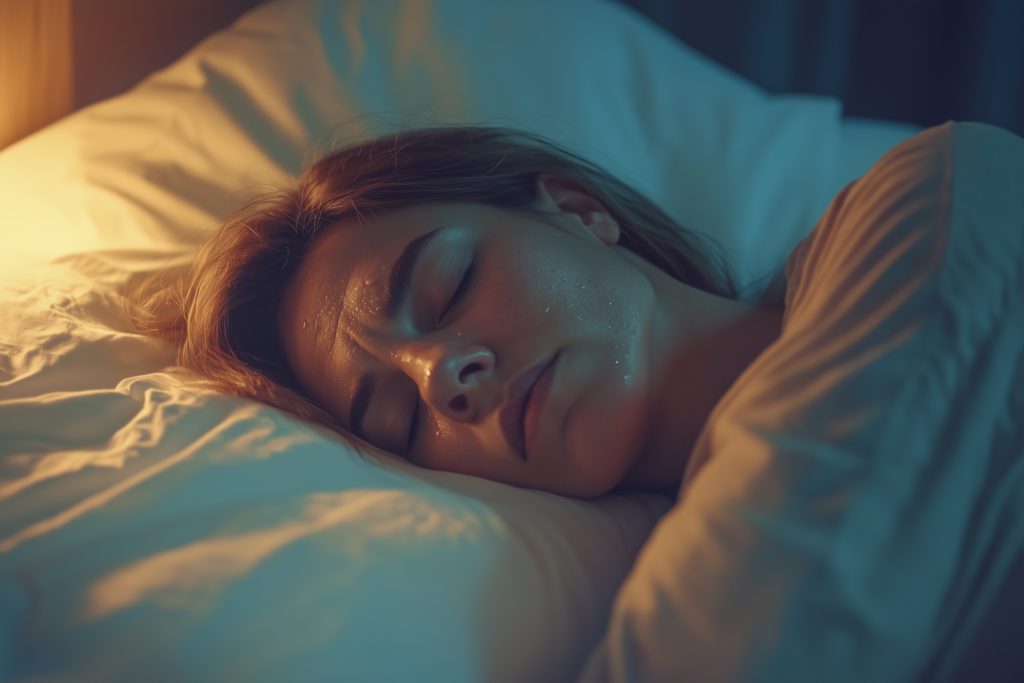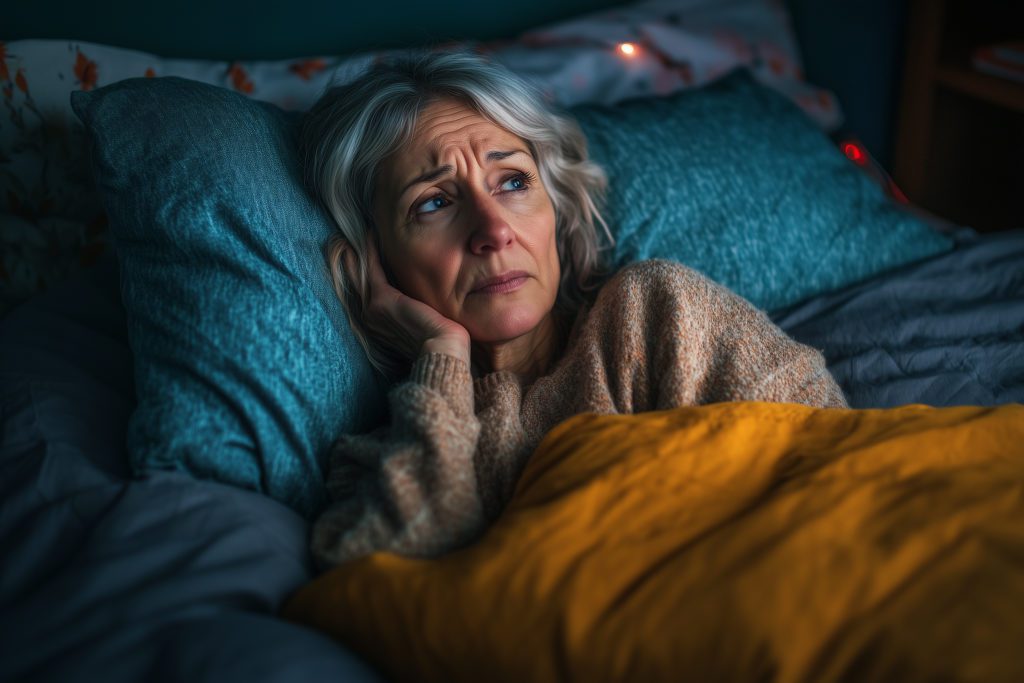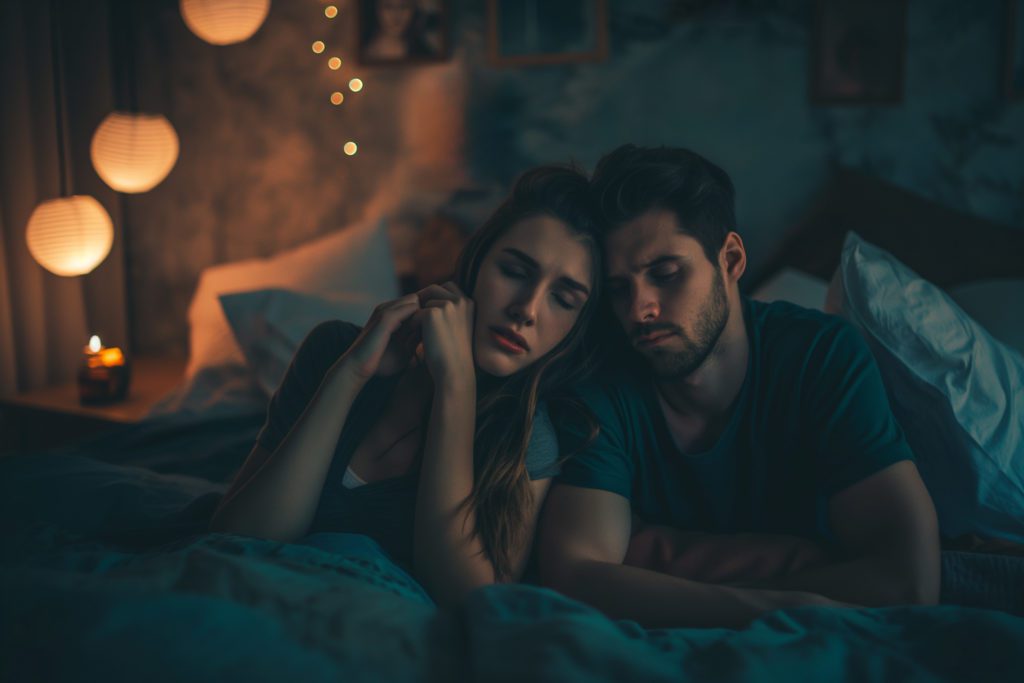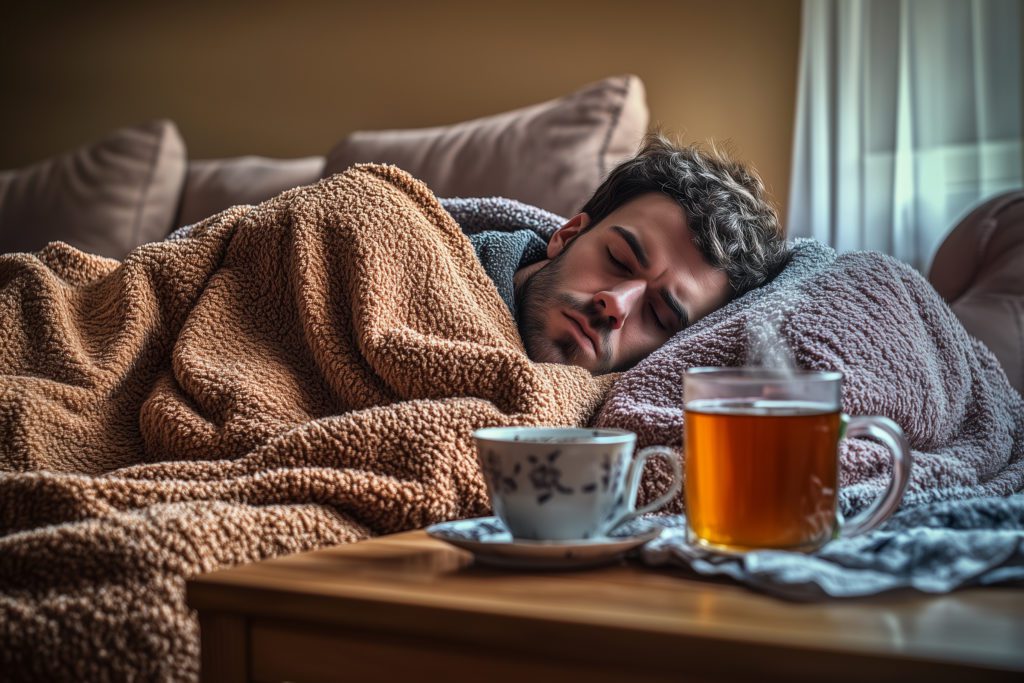
The Link Between Hormonal Imbalances, Night Sweats, and Sleep Disturbances
Sweating at night is uncomfortable and can disrupt your sleep. It’s often due to hormonal imbalances. Simple lifestyle changes and medications can help.
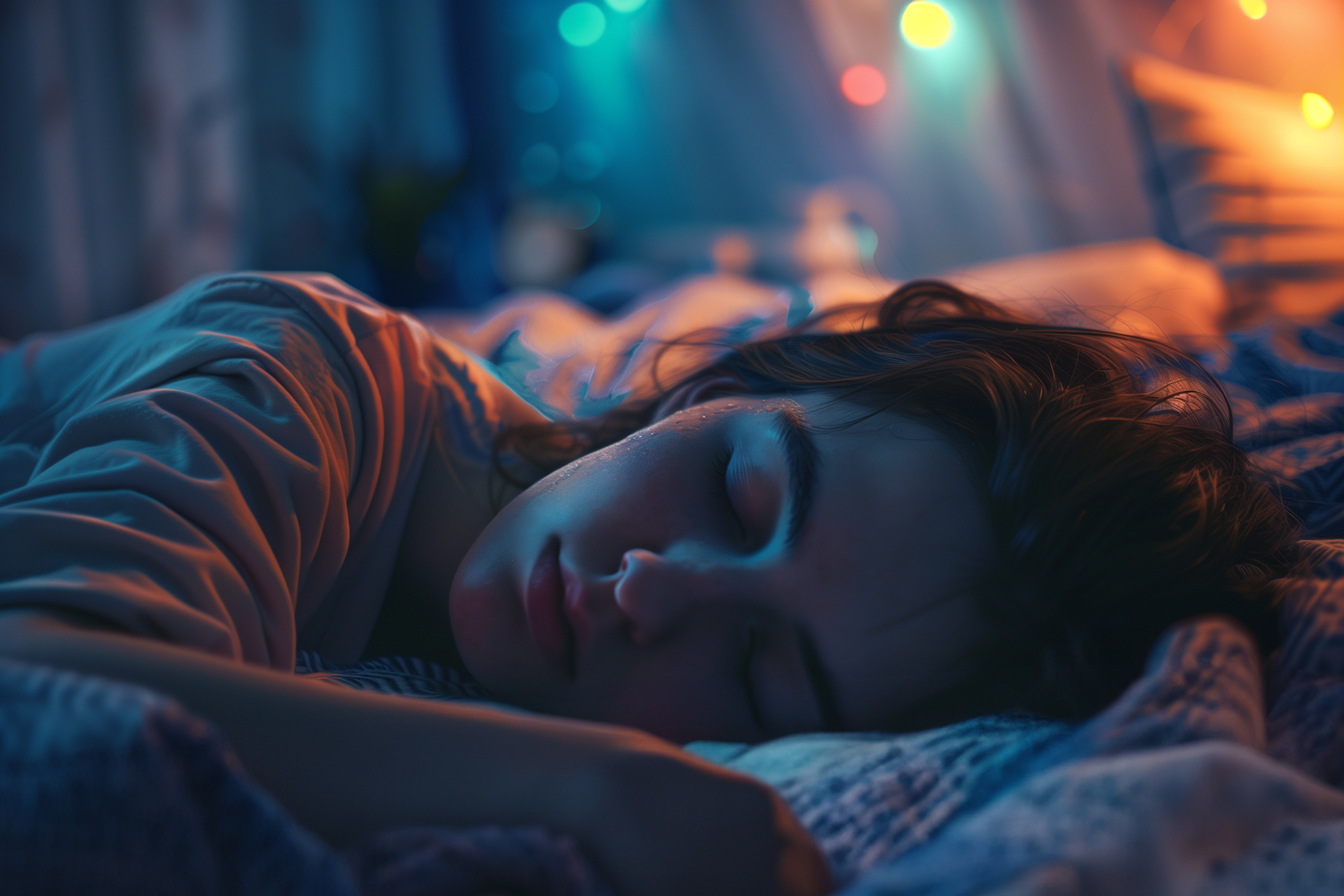
Getting eight hours of sleep can be difficult if you keep waking up in the middle of the night drenched in sweat like you just ran a marathon. The hormonal fluctuations that occur during pregnancy and menopause can cause night sweats that are severe enough to do this. Night sweats can cause lots of sleepless nights.
Keep reading to learn about the causes and symptoms of hormonal-related night sweats, how these can affect your sleep, and what you can do to get relief.
What Are Night Sweats?
Night sweats are periods of heavy sweating that can take place while you are sleeping or trying to sleep. Night sweats are usually preceded by a hot flash or sudden feeling of warmth. Night sweats are the body’s attempt to cool down in response to the hot flash. Sweating may be intense enough to soak through night clothes and bedding. Night sweats are uncomfortable and can lead to serious interruptions in sleep. They can negatively affect your quality of life.
Hormonal Imbalances and Night Sweats
Anyone can experience night sweats. However, women experience them more than men. More than 80% of women experience hot flashes or night sweats during the menopausal transition period. That is because of hormonal imbalances that occur during pregnancy, peri-menopause, and menopause. These hormonal imbalances interfere with the hypothalamus, the part of the brain that controls body temperature. This causes the body’s temperature to be disrupted resulting in night sweats.
One hormonal imbalance that can cause night sweats in men is low testosterone. Other symptoms of low testosterone include fatigue and increased body fat. Occasionally, night sweats can be the result of a hormonal disorder, such as hyperthyroidism.
Lifestyle Changes
There are certain lifestyle changes that you can make to remedy hot flashes and night sweats. These drug-free strategies can help you beat night sweats naturally.
Avoid Triggers
The following things may trigger night sweats. Taking steps to avoid these things, especially before bed, can help.
- Alcohol
- Caffeine
- Overheated bedroom
- Warm clothing
- Hot drinks
- Exercise before bed
- Smoking
- Spicy foods
- Stress
Adjust Your Environment
One of the most common causes of night sweats is your sleep environment. Making changes to your environment can help reduce night sweats. Here are some things you can do.
- Wear loose lightweight clothing to bed - Breathable cotton or bamboo is best. Avoid flannel and long pajamas.
- Lower the temperature in your bedroom - Aim for 65 degrees Fahrenheit.
- Use lightweight bedding - Ditch that extra blanket and avoid heavy comforters or blankets.
- Keep a bottle of cold water by your bed - Use an insulated bottle to keep it cold. When you get hot at night, drink up.
- Run a fan - Or open a window or turn on the air conditioner.
- Exercise early in the day - Physical activity can help balance your hormones. Just don’t work out close to bedtime.
- Consider a cooling mattress - Some mattresses trap heat. Cooling mattresses are for hot sleepers and can drastically cool you down when you sleep. Don’t want to buy an entirely new mattress? You can get a similar effect by adding a cooling mattress topper.
Lower Your Stress Levels
Are you feeling stressed, anxious, or overwhelmed? Experts say this may trigger night sweats. To ease these symptoms, try to lower your anxiety. You can use relaxation techniques like listening to relaxing music, meditation, gentle yoga, or breathwork. Cognitive behavioral therapy (CBT) and acupuncture may help, as well.
Create a Soothing Bedtime Ritual
Since night sweats can be triggered by stress, it can also help to develop some relaxing bedtime habits that can help you have a more restful night. Listen to a calming bedtime story — for adults. You can listen to these on Pillow. They help ground you and keep your mind from racing. Dim the lights in your bedroom. This signals to your body that it’s time for bed and helps promote the release of melatonin, the hormone that regulates sleep. Spend a few minutes doing some relaxing bedtime stretches.
Medications to Treat Hot Flashes
There are several medications to treat hot flashes, both hormonal and non-hormonal. These can be very helpful when it comes to getting relief from hot flashes that are the result of peri-menopause or menopause.
Non-Hormonal Medications
Two non-hormonal medications are approved by the Food and Drug Administration (FDA) for hot flashes:
- Paroxetine (Brisdelle)
- Fezolinetant (Veozah)
Several antidepressants have shown promising results in treating hot flashes. Although they aren’t approved for use by the FDA, these medications are often prescribed off-label for hot flashes.
- Fluoxetine (Prozac)
- Paroxetine (Paxil)
- Escitalopram (Lexapro)
- Citalopram (Celexa)
Hormone Replacement Therapy
Hormone replacement therapy (HRT) is very effective in treating hot flashes and other symptoms of menopause. It helps balance progesterone and estrogen levels. However, HRT may not be suitable for everyone and it has a risk of serious side effects. There are newer formulations of HRT on the market that seem to have fewer side effects compared to older types.
When Should You See A Doctor About Night Sweats?
If night sweats are seriously impacting your sleep, or you have other symptoms too, like unexplained weight loss, it’s a good idea to talk to your doctor. Your physician can review your symptoms and do testing to determine if your night sweats are caused by menopause or something else like cancer. Then you and your doctor can work together to find a solution to put a stop to the pesky night sweats.
Don’t Let Night Sweats Keep You Awake
Night sweats can disturb your sleep night after night. The good news is that there are things you can do to limit night sweats and get better sleep.
Just remember — what works for someone else to relieve night sweats may not work for you. It’s a good idea to try different treatments until you find what works best. You can track your sleep using Pillow to determine exactly how different interventions impact your sleep.
FAQ
Do night sweats always indicate a hormonal issue?
No, while hormonal imbalances are a common cause, night sweats can also be linked to infections, neurological disorders, and lifestyle factors such as alcohol consumption and dietary choices. If night sweats persist despite lifestyle changes, a medical evaluation is recommended to rule out serious underlying conditions.
How do night sweats impact sleep quality?
Night sweats can severely disrupt sleep by causing frequent awakenings, discomfort from damp bedding, and an overall restless night. This leads to poor sleep quality, daytime fatigue, mood swings, and reduced focus. Chronic sleep disruption from night sweats can also contribute to anxiety and stress, worsening the condition further.
Can men experience night sweats due to hormonal imbalances?
Yes, men can experience night sweats due to low testosterone, a condition sometimes called andropause. Testosterone plays a role in body temperature regulation, and its decline can lead to excessive sweating at night. Other causes in men include stress, infections, and medications that impact hormone levels.
Are there any medications that can cause night sweats?
Yes, some medications, including antidepressants, hormone therapy drugs, steroids, and even certain diabetes medications, can trigger night sweats as a side effect. These drugs may interfere with temperature regulation, causing excessive sweating during sleep. If symptoms persist, consult a doctor about adjusting your medication.
Can dehydration make night sweats worse?
Yes, dehydration can worsen night sweats. When the body lacks enough fluids, it struggles to regulate temperature efficiently, making sweating more intense. Additionally, dehydration can lead to headaches, dizziness, and fatigue, further disrupting sleep. Drinking enough water throughout the day and before bed (in moderation) can help manage symptoms.
Do hormonal night sweats go away on their own?
It depends on the cause. Night sweats due to temporary hormonal changes, such as pregnancy or perimenopause, may subside over time. However, persistent night sweats from chronic conditions like thyroid imbalances or testosterone deficiencies may require treatment. If symptoms last for months, consulting a healthcare provider is recommended.

Written by
Emily Mendez
Emily Mendez is a former therapist and mental health author. She is one of the leading voices in mental health. Emily's writing has appeared in eCounseling, SonderMind, and more. Emily is frequently interviewed by Healthline, Fatherly, INSIDER, Family Circle, and other national media for her advice and expert opinion on the latest mental health topics.
Download Pillow
Get help
Press & News
Legal
Connect
X (Twitter)
Company
Copyright © Neybox Digital Ltd.
